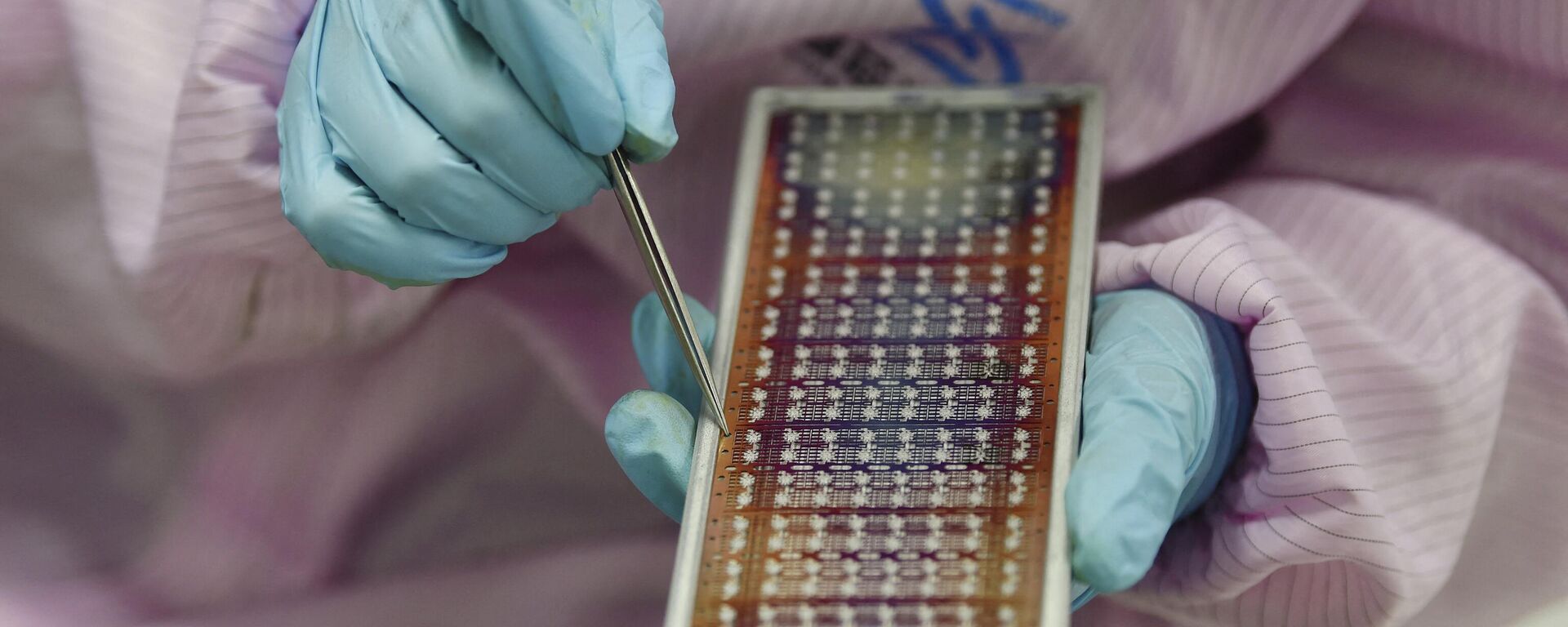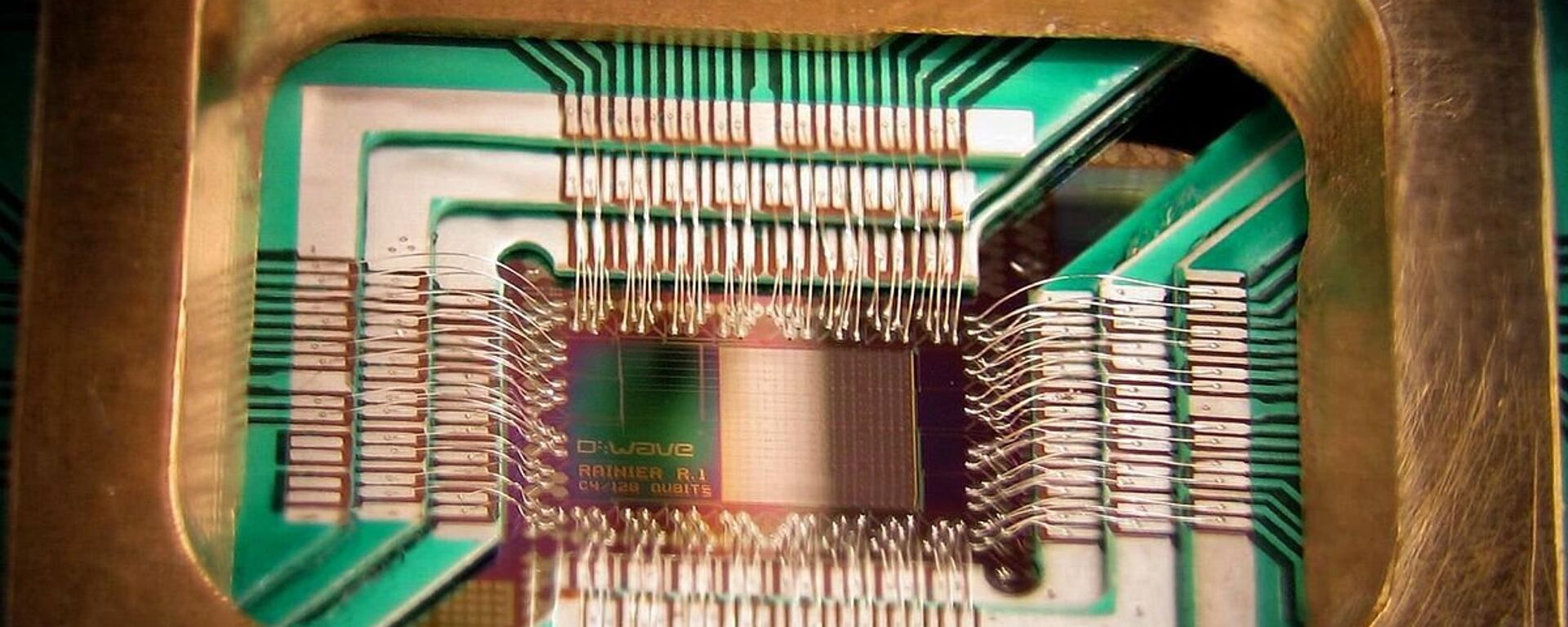https://sputnikglobe.com/20240407/japans-semiconductor-industry-gets-lifeline-with-tsmcs-first-chip-plant-1117790588.html
Japan’s Semiconductor Industry Gets Lifeline With TSMC’s First Chip Plant
Japan’s Semiconductor Industry Gets Lifeline With TSMC’s First Chip Plant
Sputnik International
With TSMC’s Kumamoto chip plant buzzing, its CEO Wei and Japan’s premier underscores the semiconductor giant’s role in Tokyo’s revival of its crumbling chip industry amid huge investments and expansion plans.
2024-04-07T12:56+0000
2024-04-07T12:56+0000
2024-04-07T12:56+0000
asia
newsfeed
fumio kishida
tokyo
taiwan
japan
taiwan semiconductor manufacturing company (tsmc)
toyota
https://cdn1.img.sputnikglobe.com/img/07e5/04/01/1082509354_0:0:3073:1728_1920x0_80_0_0_f9f46b8c4fd7ef664042afe26c494e08.jpg
Taiwan Semiconductor Manufacturing Co. (TSMC) has told Japan’s Prime Minister Fumio Kishida that it plans to hit a 60 percent domestic sourcing target for its first chip facility in the nation by 2030.TSMC’s CEO, C.C. Wei shared this aims to Kishida on Saturday while the PM toured the company’s plant in Kikuyo, Kumamoto Prefecture.Nina Kao, a spokesperson for the semiconductor company, specified that the objective concerns secondary materials used in the chip production process, excluding those integrated into the end products, and does not include machinery.Tokyo has pumped ¥476 billion ($3.1 billion) into TSMC’s first factory, a joint venture partnership involving the Taiwanese semiconductor maker and indigenous Japanese companies like Denso, Sony Group and Toyota.Japanese authorities anticipate that TSMC’s presence will enhance local suppliers’ technological capabilities and business opportunities.TSMC said it plans to start shipping logic chips for camera sensors and cars from the first facility in Kumamoto by the end of this year.Additionally, Wei stated during his meeting with Kishida on Saturday that the chip manufacturer intends to construct its second facility in Kikuyo, Japan. Tokyo has pledged an additional ¥732 billion ($4.8 billion) in subsidies for TSMC to facilitate that expansion.Japan’s reliance on TSMC underscores the pivotal role played by the world’s contract chipmaking giant in Tokyo’s ambitious plans to rejuvenate its ailing semiconductor manufacturing industry, which is valued at billions. But Japan is betting on an overarching objective to foster a homegrown champion through the foundry venture Rapidus, led by seasoned industry experts and aiming for high-volume manufacturing of advanced chips on Hokkaido Island beginning in 2027.Research firm TrendForce projects that Taiwan will maintain control over about two-thirds of the foundry capacity for advanced processes by 2027, but its lead is expected to diminish due to aggressive US expansion.However, TSMC faces a significant problem in Japan: labor shortages, Soei Kawamura, a researcher in the business development department at the center, told the media.Over the past twenty years, the workforce in Japan’s chip-related industries has fallen by around twenty percent. Estimates provided by the Japan Electronics and Information Technology Industries Association (JEITA) suggest that major domestic chip companies must recruit an additional 40,000 employees within the next decade.
https://sputnikglobe.com/20230810/why-is-tsmc-building-a-multibillion-dollar-semiconductor-chip-factory-in-germany-1112491419.html
https://sputnikglobe.com/20230721/taiwanese-semiconductor-giant-delays-arizona-plant-production-amid-us-china-chip-race-1112027823.html
tokyo
taiwan
japan
2024
Chimauchem Nwosu
https://cdn1.img.sputnikglobe.com/img/07e7/09/01/1113046371_0:99:1536:1635_100x100_80_0_0_9c5c627283eca931c39fe4852bbb301c.jpg
Chimauchem Nwosu
https://cdn1.img.sputnikglobe.com/img/07e7/09/01/1113046371_0:99:1536:1635_100x100_80_0_0_9c5c627283eca931c39fe4852bbb301c.jpg
News
en_EN
https://cdn1.img.sputnikglobe.com/img/07e5/04/01/1082509354_170:0:2901:2048_1920x0_80_0_0_7c3ef73fc7a913f6abb998bfa4eabe2c.jpg
Chimauchem Nwosu
https://cdn1.img.sputnikglobe.com/img/07e7/09/01/1113046371_0:99:1536:1635_100x100_80_0_0_9c5c627283eca931c39fe4852bbb301c.jpg
tsmc, tsmc japan chip plant, local procurement, semiconductor, japan’s chip industry, semiconductor investment, semiconductor technology, chip manufacturing technology, japan’s labor shortages, chip supply chain, first japan facility
tsmc, tsmc japan chip plant, local procurement, semiconductor, japan’s chip industry, semiconductor investment, semiconductor technology, chip manufacturing technology, japan’s labor shortages, chip supply chain, first japan facility
With TSMC’s Kumamoto chip plant buzzing, its CEO CC Wei and Japan’s premier stress the semiconductor giant’s role in Tokyo’s revival of its crumbling chip industry amid huge investments and expansion plans.
Taiwan Semiconductor Manufacturing Co. (TSMC) has told Japan’s Prime Minister Fumio Kishida that it plans to hit a 60 percent domestic sourcing target for its first chip facility in the nation by 2030.
TSMC’s CEO, C.C. Wei shared this aims to Kishida on Saturday while the PM toured the company’s plant in Kikuyo, Kumamoto Prefecture.
Nina Kao, a spokesperson for the semiconductor company, specified that the objective concerns secondary materials used in the chip production process, excluding those integrated into the end products, and does not include machinery.
Tokyo has pumped ¥476 billion ($3.1 billion) into TSMC’s first factory, a joint venture partnership involving the Taiwanese semiconductor maker and indigenous Japanese companies like Denso, Sony Group and Toyota.
“I believe this project will have positive ripple effects throughout Japan. It is key for not only the semiconductor industry but also a wide range of businesses such as electric vehicles and electronics,” Kishida told the media.
Additionally, Wei stated during his meeting with Kishida on Saturday that the chip manufacturer intends to construct its second facility in Kikuyo, Japan. Tokyo has pledged an additional ¥732 billion ($4.8 billion) in subsidies for TSMC to facilitate that expansion.
But Japan is betting on an overarching objective to foster a homegrown champion through the foundry venture Rapidus, led by seasoned industry experts and aiming for high-volume manufacturing of advanced chips on Hokkaido Island beginning in 2027.
“The possibility of having TSMC build a fab in Japan really rallied support from disparate parts of the semiconductor industry,” Damian Thong, head of Japan research at Macquarie Capital Securities, told reporters.
Research firm TrendForce projects that Taiwan will maintain control over about two-thirds of the foundry capacity for advanced processes by 2027, but its lead is expected to diminish due to aggressive US expansion.
However, TSMC faces a significant problem in Japan: labor shortages, Soei Kawamura, a researcher in the business development department at the center, told the media.
Over the past twenty years, the workforce in Japan’s chip-related industries has fallen by around twenty percent. Estimates provided by the Japan Electronics and Information Technology Industries Association (JEITA) suggest that major domestic chip companies must recruit an additional 40,000 employees within the next decade.
“I don’t doubt TSMC will be dominant, but Japan will seek to prove that they are valid as a number two,” Thong remarked.





